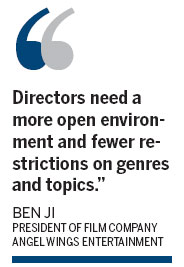|
 |
Chinese film authorities are considering returning their 5 percent cut of box office revenues to theaters that show more domestic films.
The move would help Chinese film companies, which are facing stiffer competition from Hollywood movies as the annual quota for foreign films in China is increased from 20 to 34.
The central government collects 5 percent of theater revenues for the National Film Development Fund, which channels the money to support rural film screenings, and children's and patriotic films.
The State Administration of Radio, Film and TV - the industry's top regulator in China - recently invited directors, scholars and insiders from production, distribution and exhibition businesses to discuss the proposal's feasibility. Other possibilities include returning only part of the tax.
Zhang Hongsen, deputy director of the State Film Bureau affiliated to the administration, confirmed the proposal had been drafted but emphasized it's still in the planning stage.
"It would be a grand project that concerns many fields, and details are far from available," he says.
Filmmakersmay feel more urgent about receiving clear signals from the government.
Domestic films have faltered at the box office in the past few months, as they've had to compete with such Hollywood blockbusters as The Avengers and Titanic.
According to EntGroup, a leading Chinese entertainment industry research center, April saw only 180 million yuan ($28 million) generated by domestic films and 1.2 billion yuan by foreign films - overwhelmingly Hollywood releases.
In the first three weeks of May, 16 local films grossed only 150 million yuan, compared to the 750 million yuan brought in by nine foreign films.
A new deal hammered out during Vice-President Xi Jinping's visit to the United States earlier this year may have deepened insiders' anxiety about Hollywood's impact.
The deal raised the number of revenue-sharing foreign films released in Chinese theaters from 20 to 34 a year. At the same time, their box office share increased from the current 13 percent to 25 percent.
Also, Chinese distributors now buy about 30 flat-fee foreign films a year for theatrical release. They pay one-time fees for the films, whose financiers do not get a box office cut.
Wang Hongwei, deputy dean of the Beijing Film Academy's directing department, hails the proposal but reminds domestic filmmakers of the importance of quality. "The proposal helps local films get more chances to be seen by audiences, even if with just one more day or one more screening," he says.
"But it won't work for bad movies, anyway. Theater managers are very careful about their choices because their business is very market-oriented."
But the quality of Chinese movies is closely connected to policies, believes Ben Ji, president of film company Angel Wings Entertainment. "Directors need a more open environment and fewer restrictions on genres and topics," he says.
Ji has been reading lots of novels to find potential film stories, and was surprised at the diversity and courage of the content. One book, for example, is about a 19-year-old boy who commits murder just to raise people's awareness of his existence.
"Such topics are impossible to put on the big screens," he says.
Yang Shupeng, director of the black comedy An Inaccurate Memoir, hopes for a clear and fair standard for film content.
"Domestic filmmakers are not allowed to shoot ghost stories, but we had Ghost Rider, starring Nicolas Cage, in theaters," he says.
"We obviously can't compete with Hollywood in visual effects and action scenes. The best advantage we have is our understanding of contemporary China. There are so many issues worthy of discussion and related to our audiences, but we have to first deal with restrictions on topics and genres."
Wang, of the Beijing Film Academy, suggests authorities ease restrictions on film content and adopt less sensitive approaches. "New York has been blown up a thousand times in US films, but it is impossible to depict any signature building in China being destroyed in domestic films," he says.
"The explosion creates impressive visual effects. How about we relax a little on this? Also, we can't have bad cops on the big screen. Then, how about we have good cops, who have certain shortcomings? Flat characters don't interest audiences."
Huang Qunfei, general manager of Beijing-based theater chain New Film Association Company, holds "cautious optimism" about the rivalry between domestic and Hollywood films. "Chinese films screened in the first half of this year were mainly mid-budget releases that competed with some of the most popular Hollywood pictures," he said.
"The second half of 2012 will feature some blockbusters by star filmmakers, such as Jackie Chan and Feng Xiaogang. I think things will get better then."
An urgent problem that China's filmmakers can start solving now, he says, is to look at themselves and think about how to make films audiences want to see - rather than stories that are only important to them.
liuw@chinadaily.com.cn
